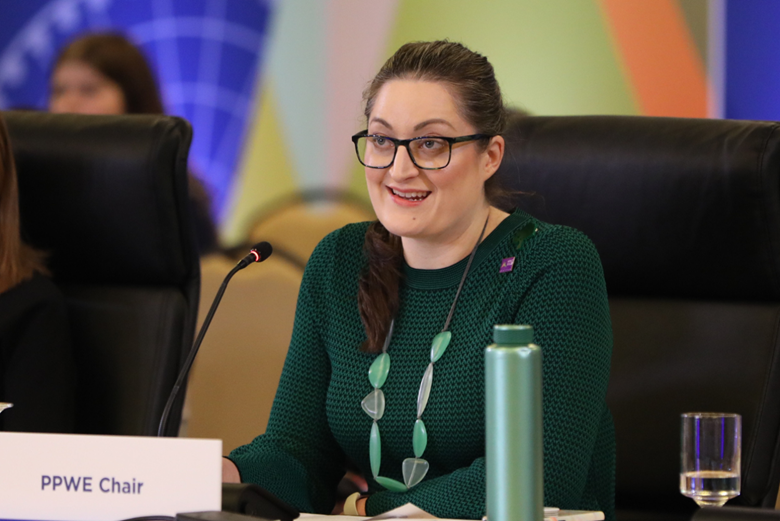
It is a critical time for APEC to renew its commitments and meaningfully deliver change in the region to ensure social equity.
The High-Level Policy Dialogue on Women and the Economy held in Seattle last month brought together global experts to discuss structural reform that mainstreams gender analysis through budget processes, policy, and within our own APEC practices. More than that, we had ministers and ambassadors, leaders of industry and senior officials together in a meeting room-a powerful bunch, the ones that wield influence, the ones that decide-deliberating on what we need to do more of in order to unlock women's economic potential.
Why is this work important to APEC? Because we represent 1.5 billion women and girls across our economies-1.5 billion women and girls who do not enjoy the same opportunities, prosperity, freedoms or rights as their male counterparts.
A rising tide does not necessarily lift all boats. I am pleased to see so much good work underway across our region in closing the gender gap. But good is not good enough. Good gets us equality in 300 years. Our women and girls deserve better.
Women and girls do not automatically share in broad social advances unless there is commitment and action to ensure social equity. It is for us to act with purpose and intent to see this aspiration become reality.
The benefit of gender equality has been supported by sobering statistics. A study by McKinsey showed that closing the gender gap in economic participation would add up to USD 28 trillion to the global GDP, or nearly USD 17 trillion in the Asia-Pacific.
With this in mind, I cannot help but ask myself, why are we ignoring the potential gain of trillions of dollars in growth to our economies? What is stopping us from achieving gender equality? Is it fear? Are we not serious? What sustains the invisible barriers placed before women? Are they structural or systemic? And how are they reinforced by harmful gender stereotypes?
Statistics further tell us that it will take more than 130 years to close the global gender participation gap and that we are 300 years away from achieving gender equality, representing multiple generations to parity.
APEC economies are standing on a precipice. We can either be the global leader for gender equality and maximize prosperity for all our people or we can maintain status quo. This is a stark reminder for us all that we are at a critical point in time, and we have a responsibility to change the current trajectory and create a just future.
There is so much we can achieve together through APEC, but it takes the courage and bravery of individuals to make a change-to stand up and build an unstoppable momentum.
It starts with each of us.
Watch: Advancing Women's Economic Empowerment in APEC
This is a call to greater action. Instead of just tracking the incremental progress, we must raise our collective ambition to achieve gender equality. Particularly when it comes to our commitments in the 2023 Women and the Economy Forum statement, and how it translates to our action back at home.
Our societies, economies and environments are interlinked and underpinned by gender equality. We cannot realize the economic aspirations that we champion in the Asia-Pacific without progress to equalize the playing field between women and men.
The Women and the Economy Forum (WEF) has given us space to continue to improve digital inclusion as an enabler of financial security for women, grapple with the growing demand for science, technology, engineering and mathematics (STEM) qualified workers, respond to climate change, and negotiate gender equitable outcomes in trade agreements.
All of this is central to the work of APEC Policy Partnership on Women and the Economy, and essential to achieving gender equality.
But while these are important to the work that we need to keep pushing forward, there is a group that may not have received adequate attention: men.
Specifically, what does it mean for men-rather than women-to see gender equality advance so incrementally that it effectively maintains the status quo?
Whether it's by design or unintentional, men continue to benefit from women's economic inequality. They benefit from laws that discriminate against women, from women undertaking the majority of unpaid domestic and care work, and from the segregated low paid workforces. Men enjoy higher social status and income levels. They occupy more positions of authority and have greater control over decision making.
Gains in gender equality cannot be taken for granted. They are fragile, reversible, and always under pressure.
We must all do more. At every level. This is not an impossible task. But we are making choices and trade-offs every day. Trading off the future of women and girls to protect the status quo. Trading off exponential economic gains to preserve outdated systems and power structures that exclude half the population.
Unfortunately, we have become accustomed to glacial progress and have been conditioned to accept it. Again, I am asking, who benefits from delay?
Gender equality is a global commitment and a global endeavor. It benefits women and men. It is not a nice to have or a tick-box exercise, to be deferred or deprioritized against 'serious' matters of health, trade or economic prosperity. It is a prerequisite for these objectives to be achieved. It is a force multiplier.
APEC economies have incredibly powerful levers in our economic toolkit to deliver for the women and girls in our region. It is our responsibility to use them. This is no longer a matter of not knowing what to do. It is about choosing to do it. It couldn't be a more important and critical time for us to come together to renew our commitments and meaningfully deliver change in our region.
APEC can lead the way. We can do it for the money, prosperity and growth and we can do it because it is right.
***
Chantelle Stratford is the chair of the APEC Policy Partnership on Women and the Economy.






